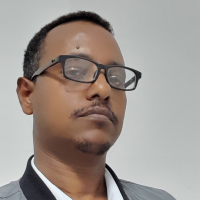Organization:Ministry of Women and Social Affairs
Title: Monitoring and Evaluation Advisor for Rural Productive safety Net (RPSNP) program
Please tell us about your role in advocating for or strengthening the social service workforce.
I successfully managed and played a critical role (Chief of Party/Project Manager) in the implementation of a project entitled: Strengthening Social Service System in Ethiopia, SSSSE (Financed by USAID-PEPFAR) and implemented by the Government of Ethiopia (GoE) and the Society of Sociologists, Social Workers and Anthropologists of Ethiopia (ESSSWA). I led curriculum and module development and assisted the Government of Ethiopia to deploy a preservice training system which has been/is integrated with the national vocational and training strategy for middle- level social service worker training in Ethiopia. I managed harmonization and systematic integration of critical skills and knowledge (like case management, child protection, community-based service mapping, referral linkages, gender sensitive social services, social protection etc.) into the mainstream training curriculum which is now under implementation in the country. Since December 2018, I also have a crucial role in introducing comprehensive case management interventions into the Ethiopian Rural Productive safety Net (RPSNP) program, the largest social protection system, which serves poor rural citizens. The case management and complementary social services linkage has been intended to be carried out by the graduates of SSSSE project which was intended to strengthen the social services rendered to vulnerable children through integration of the workforce with the larger country social protection policy and strategy. I am in an excellent position to further facilitate provision of social services for vulnerable children and families through deployment of trained social services workers in urban Ethiopia where the urban safety net program has been implemented. As an Monitoring and Evaluation Specialist, I have a great deal of roles to preform in relation to social service workforce strengthening towards the wellbeing of vulnerable children and families through generation of evidence.
What motivates you to work in this field?
Of course, motivation is very important for any endeavor in this dynamic world. When it comes to mine, I have so many factors starting from my professional career (Social Worker/Sociologist) to everyday encounters in every walk of my life in the non-enlightened Africa, Ethiopia, Addis Ababa. There are resources but they are mismanaged in order to address the needs of vulnerable citizens. In many of my previous careers, I found the toughest task in persuading decision makers about the constructive contributions of social development in general and the roles trained social service workers can provide to vulnerable citizens, in particular. In Ethiopia, vulnerability is a day to day encounter and everyone of us is at risk of many types of shocks (economic, social, physical, biological, psychological and mental), those call up on intervention of helping professions including social workers and psychologists. Hence, so many factors motivated me to deep dive into social work and social service system strengthening programs in my profession.
From your experience, please describe one or two key challenges that you face in strengthening the social service workforce?
Most of the decision makers (for resources, policies, etc.) need some sort of physically counted, or statistically significant data to show impact, positive change, etc. in order to win their perception and their decision to commit resources for social service related programs. Generating valid and quantified evidence is difficult in the area of social service, particularly for soft skills and knowledge development and systems building programs. Because, in most of the cases, positive social and behavioral changes result from social service interventions need more time compared to other physical or biomedical interventions.
How long have you been a member of the Alliance?
I think I am a member since 2022. But, since 2014, I have actively read publications and newsletters uploaded to the Alliance's website. I have also used materials for training and knowledge sharing sessions.
What value does the Alliance bring to your efforts to strengthen the social service workforce?
The Alliance is an excellent platform to share resources (knowledge, skills, experiences, etc.) from other countries, experienced professionals and practitioners in the area.

